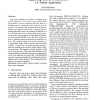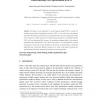216
click to vote
NFM
2011
14 years 9 months ago
2011
Synthesis of finite-state machines from linear-time temporal logic (LTL) formulas is an important formal specification debugging technique for reactive systems and can quickly ge...
115
click to vote
AAI
2010
14 years 9 months ago
2010
In this paper, we propose a proof system for reasoning on certain specifications of secure authentication systems. For this purpose, a new logic, sequence-indexed linear-time temp...
120
click to vote
ENTCS
2002
15 years 1 months ago
2002
Abstract. We present an extension to linear-time temporal logic (LTL) that combines the temporal specification with the collection of statistical data. By collecting statistics ove...
113
click to vote
ACTA
2004
15 years 2 months ago
2004
We study the complexity of satisfiability and model-checking of the linear-time temporal logic with past (pltl). More precisely, we consider several fragments of pltl, depending o...
119
click to vote
IANDC
2007
15 years 2 months ago
2007
We consider an extension of linear-time temporal logic (LTL) with constraints interpreted over a concrete domain. We use a new automata-theoretic technique to show pspace decidabi...
104
click to vote
ENTCS
2006
15 years 2 months ago
2006
We consider a first-order property specification language for run-time monitoring of dynamic systems. The language is based on a linear-time temporal logic and offers two kinds of...
111
click to vote
VLDB
1992
ACM
15 years 6 months ago
1992
ACM
This paper considers the problem of adding list as a type constructor to an object-oriented data model. In particular, we are concerned with how lists in a database can be constru...
107
click to vote
LICS
2002
IEEE
15 years 7 months ago
2002
IEEE
We investigate NLTL, a linear-time temporal logic with forgettable past. NLTL can be exponentially more succinct than LTL + Past (which in turn can be more succinct than LTL). We ...
148
Voted
FM
2003
Springer
15 years 7 months ago
2003
Springer
We present a novel application on model checking through SPIN as a means for verifying purely descriptive specifications written in TRIO, a first order, linear-time temporal logic ...
120
click to vote
LFCS
2007
Springer
15 years 8 months ago
2007
Springer
Various logical formalisms with the freeze quantifier have been recently considered to model computer systems even though this is a powerful mechanism that often leads to undecida...


